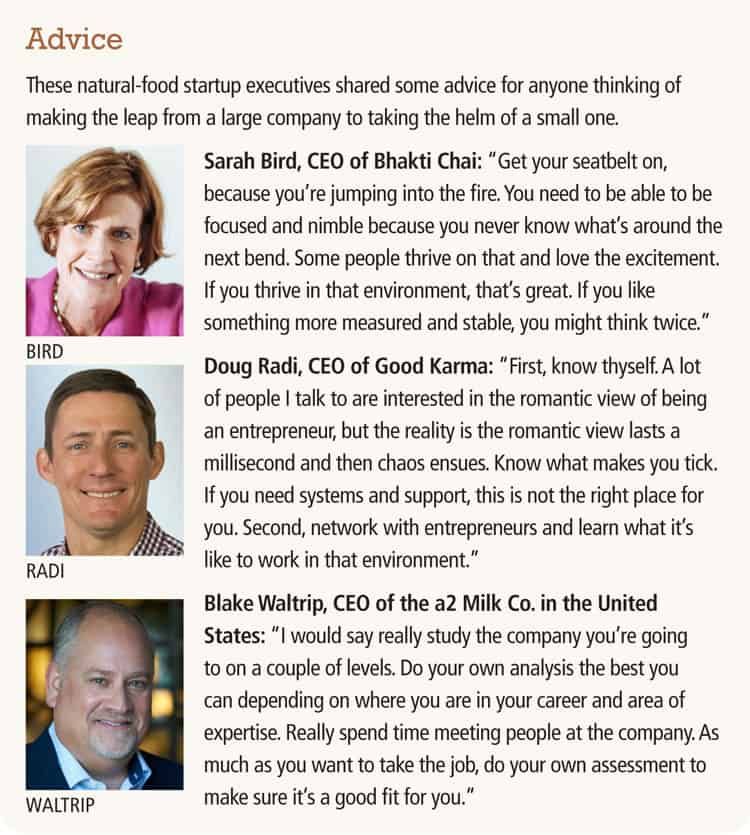Leaders start fresh starts at startups

A side effect of Boulder being a hub for natural food is that as companies grow and become acquired by bigger players, the talent that has grown within those companies are left looking to spread their wings and gain new experience.
That’s led to the trend of many experienced long-time careerists in the natural space taking the helm of new startups.
 Sarah Bird, for example, was chief marketing officer of Annie’s Homegrown Food, but when the company was acquired by General Mills, a CMO was no longer needed.
Sarah Bird, for example, was chief marketing officer of Annie’s Homegrown Food, but when the company was acquired by General Mills, a CMO was no longer needed.
SPONSORED CONTENT
The many benefits of simple, coordinated healthcare
Kaiser Permanente combines health care and coverage in one connected system to maximize employee health and minimize employer costs.
After working in marketing for two other startups, Bird, who worked for Annie’s for 15 years, had a chance at her dream job: to serve as chief executive officer of a natural products startup.
“The ultimate career goal to me was to be CEO of a little company in this industry,” Bird told BizWest. “One day I was in Boulder for something else, was putting money in the meter on Pearl Street and bumped into a friend who runs operations at Bhakti. He said I should meet Brook (Eddy, founder of Bhakti Chai) but she was interviewing candidates to be CEO. I said I’d like to have that job. I don’t know what possessed me.”
Bird said she ended up talking to Eddy that day and got the CEO job.
“I knew I wanted to focus on building a brand that has a commitment to good,” she said. “The DNA of the Bhakti business aligned with what’s important to me.”
T.J. McIntyre, CEO of Bobo’s, was looking for a change when he took the helm, after working in the industry for 20 years at companies like WhiteWave and Boulder Brands.
“I wanted to go back upstream in the natural food industry,” McIntyre said. “I wanted to work on a business where I would be far more oriented with the production and marketing of the food itself. When I was working at Boulder Brands’ the natural portfolio I managed included manufacturing 40 different copackers. When you’re managing a business like that, you’re not at all close to how the product was produced.”
McIntyre said he wanted something different, which is why he accepted the job at Bobo’s, where everyone works in the bakery and is closely involved with the making of the product.
As these experienced leaders in the industry become available, either through acquisition or because they’re ready for change, they bring the benefit of their years in the industry to a company still getting its legs under it.
“Big companies have well-oiled-machine systems that work really well,” said Doug Radi, CEO of Good Karma, who previously worked at brands like Frito-Lay, Horizon when it was integrated into WhiteWave and Rudi’s. “Folks who are adept and understand those tools can bring them to a startup company and bring a level of sophistication in those functional areas to significantly improve a small company’s outcome.”
Radi likened it to someone experienced at a big manufacturer coming into a new company that wants to do manufacturing but doesn’t know the most efficient ways to do it yet.
“When an expert can come in and tighten the system up, improve the ability to operate and the financial implications of that, a big-company-experienced person can be a huge asset to a small company.”
But just because someone has experience at a large company doesn’t immediately mean they’re ready to lead a startup. There are real differences between the two, said Blake Waltrip, CEO of the a2 Milk Co. Waltrip previously worked at Nestle USA and Hain Celestial Group, among other startups in and outside the industry.
“One of the biggest differences is resources,” Waltrip said. “You have to learn to make a decision based on experience and gut with as much research and analysis as you can understand. You don’t nearly have the level of support you’re used to with a larger company, where there’s a number of different people and entire departments focused on different aspects. At a startup, you’re a jack-of-all-trades.”
While there may be fewer resources, there can be a lot of heart that comes with working at a startup.
“What’s really fun about them is you can build a team of people really motivated and committed to what they do,” Waltrip said. “At a large corporation, a lot of people are putting their time in. At a small organization, everyone feels a sense of ownership for the business.”
A side effect of Boulder being a hub for natural food is that as companies grow and become acquired by bigger players, the talent that has grown within those companies are left looking to spread their wings and gain new experience.
That’s led to the trend of many experienced long-time careerists in the natural space taking the helm of new startups.
 Sarah Bird, for example, was chief marketing officer of Annie’s Homegrown Food, but when the company was acquired by General Mills, a CMO was…
Sarah Bird, for example, was chief marketing officer of Annie’s Homegrown Food, but when the company was acquired by General Mills, a CMO was…
THIS ARTICLE IS FOR SUBSCRIBERS ONLY
Continue reading for less than $3 per week!
Get a month of award-winning local business news, trends and insights
Access award-winning content today!

